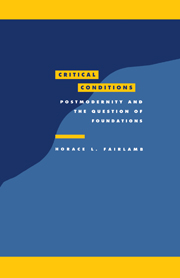Book contents
- Frontmatter
- Contents
- Preface
- Acknowledgments
- List of abbreviations
- Introduction
- 1 Fish's strong conventions: the mind's own world
- 2 Brave new words: postmodernism on epistemology
- 3 Theory and/or deconstruction: Derrida's slippage
- 4 Gadamer's universalism: the limits of hermeneutic authority
- 5 Critical politics: deconstruction for Americans
- 6 Foucault's microphysical politics: Big Brother is missing
- 7 Habermas' neo-formalism: theory as praxis
- 8 Critical theory and postmodern localism: rebels without a cause
- Conclusion
- Bibliography
- Index
5 - Critical politics: deconstruction for Americans
Published online by Cambridge University Press: 01 June 2011
- Frontmatter
- Contents
- Preface
- Acknowledgments
- List of abbreviations
- Introduction
- 1 Fish's strong conventions: the mind's own world
- 2 Brave new words: postmodernism on epistemology
- 3 Theory and/or deconstruction: Derrida's slippage
- 4 Gadamer's universalism: the limits of hermeneutic authority
- 5 Critical politics: deconstruction for Americans
- 6 Foucault's microphysical politics: Big Brother is missing
- 7 Habermas' neo-formalism: theory as praxis
- 8 Critical theory and postmodern localism: rebels without a cause
- Conclusion
- Bibliography
- Index
Summary
Professional investigations: searching the premises
During the 1950s, among such prominent literary critics as Crane, Frye, Wellek, and Warren, one heard statements to the effect that criticism had exhausted its self-imposed tutelage, and therefore was in need of theoretical foundations. By the mid-sixties, various American critics had responded to that need, while structuralism was getting considerable attention in a variety of human sciences. On the very occasion, however, when structuralism was being officially imported to America, critical optimism about foundations was challenged by Derrida's seminal “Structure, sign, and play,” whose hermeneutics of suspicion doubted whether the human sciences could be sciences. Theoretical attempts to domesticate meaning, according to Derrida, always proceed by closing off some alternative interpretations, while ignoring or repressing the new alternatives they open up. Derrida suggested, furthermore, that philosophical valor was the better part of discretion, dismissing even the hope of finding metaphysical comfort in the human sciences.
Derrida's debut in Baltimore was a landmark step in the emergence of what came to be known as deconstructive practice, an activity in which criticism's theoretical methods are no more decisive of meaning than the circumstances and habits of social and historical contexts. In fact, post-structuralists argued, not only does theory not give us the tools by which to determine the validity of interpretation, it tells us why such expectations are misleading and impossible of fulfilment. All interpretation is perpetually subject to dislocation.
- Type
- Chapter
- Information
- Critical ConditionsPostmodernity and the Question of Foundations, pp. 135 - 170Publisher: Cambridge University PressPrint publication year: 1994



